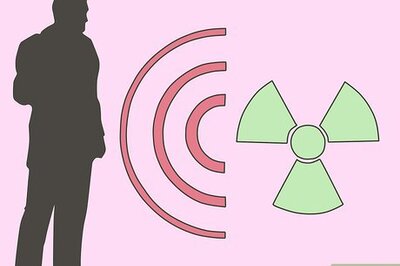
views
Your partner isn’t meeting your needs.

In a healthy relationship, you and your partner are able to meet each other’s needs by communicating your feelings, establishing healthy boundaries, and having a firm foundation of trust between the two of you. If you feel like your partner consistently refuses to communicate and understand your needs and desires, it might be time to end things. Example of a healthy relationship: You really enjoy physical affection and express this to your partner. They make intentional efforts to be a little more physical with you, like cuddling in bed and giving you a back rub after a long day. Example of an unhealthy relationship: You tell your partner that you enjoy physical affection, but they never make an effort to be more touchy-feely with you, even when you share these needs multiple times.
You’re leaning on others to meet your needs.

While it’s totally normal (and great) for partners to get some time to themselves, it’s important to feel emotionally and physically fulfilled by your partner when you’re in a monogamous relationship. If you feel tempted to find physical and/or emotional intimacy from other people, you may need to reevaluate your relationship. Example of a healthy relationship: You feel close to your partner and comfortable getting intimate with them. You rarely feel any temptation to have an emotional or physical connection with someone else. Example of an unhealthy relationship: You feel like your partner isn’t satisfying your desires when it comes to emotional and physical intimacy, and you think about stepping out of the relationship to have these desires fulfilled. Important note: Being intimate with other people is fine if you and your partner have discussed and committed to an ethically non-monogamous relationship (e.g., polyamory).
You feel uncomfortable communicating.

Communication is an essential ingredient of any healthy relationship. Talking things out—both the good and the bad—is critical to the health of your partnership. Regular communication allows both you and your partner to feel heard and gives you a chance to express your needs, desires, goals, and dreams. If you don’t feel comfortable having any lines of communication open with your partner, you may need to think if this relationship is good for you in the long-term. Example of a healthy relationship: You and your partner set aside time daily to talk about each others’ days and discuss anything that’s on your minds. Example of an unhealthy relationship: It often feels like you and your partner are passing each other like ships in the night—you hardly ever speak or have meaningful conversations.
You don’t feel like you can trust your partner.

Trust is the bedrock of any successful relationship. Without it, you’re constantly second-guessing what your partner says and does, and you’re unable to develop a meaningful connection with them. Trust doesn’t vanish overnight, though—it’s often a long-term experience that develops from doubt, suspicion, anxiety, and fear. Example of a healthy relationship: Your partner is upfront about what they’re doing and where they’ll be, and you trust that they’re being open and honest whenever they communicate with you. Example of an unhealthy relationship: Your partner says they’re working overtime one night, but you discover that they left at their usual time. This may lead you to doubt your partner in the future, which can transform into suspicion, anxiety, and a need to withdraw.
Your support system dislikes your partner.

Maybe your friends always keep your partner at arm’s length, or your parents never have anything positive to say about them. While their opinions and judgment aren’t absolute, they could be a sign that your partner isn’t the best possible match for you. Example of a healthy relationship: Your friends and loved ones talk about how kind and respectful your partner is, and how they love spending time with them. Example of an unhealthy relationship: Your friends and loved ones mention how they have a “bad feeling” about your partner and have never felt like they’re a good fit for you.
You don’t enjoy spending time with your partner.

Maybe it starts with short-term plans, like a day trip to the park or a weekend trip to the shore, only to spread to your long-term plans, like a week-long vacation. Whatever the case, it’s not a good sign if you’re unable to enjoy any quality time with your partner—in fact, it might be a sign that it’s time to end things. Example of a healthy relationship: You make intentional time to spend regular quality time with your partner, like having a weekly date night. Example of an unhealthy relationship: Setting aside time for your partner feels like a chore—spending intentional time with them is about as fun as pulling teeth.
You fantasize about being with someone else.

Most people have brief moments where they dream about being with another person, like a celebrity crush. However, these fantasies are brief and fleeting; more importantly, they don’t interfere with your feelings and perceptions of your current relationship. If you’re constantly thinking about dating someone else, it might be time for a break. Example of a healthy relationship: You spend a few moments thinking about that dreamy individual, but you can easily push the thoughts out of your mind. Example of an unhealthy relationship: You’re frequently thinking about that special someone, even while you’re spending time with your current partner.
Your relationship feels rooted in obligation.

You keep finding reasons to stay in the relationship. Maybe you share a child with your partner, or you’re absolutely terrified by the idea of being single again. These factors might make you feel obligated to stay in your current relationship, even if it isn’t particularly healthy or fulfilling. Example of a healthy relationship: You genuinely enjoy spending time with your partner—loving them is the only reason you have or need to be in your relationship. Example of an unhealthy relationship: You feel obligated to stay with a partner because you both live together or because you both belong to the same friend group or spiritual community.
You don’t really care about the relationship.

It’s hard for you to put in any effort to make the relationship work. One-sided relationships are often characterized by a partner who refuses to apologize or make any significant sacrifices in the partnership. It’s valid and understandable if you aren’t feeling the love anymore—but it’s not fair to keep the relationship going if that’s the case. Example of a healthy relationship: You and your partner regularly put in the effort to keep your relationship thriving—you have deep conversations, you compromise regularly, and you both own up to your mistakes when you make them. Example of an unhealthy relationship: You don’t feel like the relationship is a major priority to you anymore, and you rarely take time to talk and check in with your partner.
Your partner isn’t putting in effort.

Both partners need to give and take equally within a relationship. Healthy relationships require a bit of sacrifice, compromise, and effort from both parties—it can’t be just one person who’s pulling all the weight. Example of a healthy relationship: You feel like you and your partner work to have a fulfilling relationship. When difficulties arise, you’re both able to compromise and reach a solution that you’re both happy with. Example of an unhealthy relationship: You’re always canceling plans and rearranging your life to work around your partner’s schedule, but they never give you the same courtesy.
Your relationship feels very hot and cold.

Every relationship has its ups and downs, but it’s not meant to be an emotional rollercoaster. You deserve to be in a relationship with someone who consistently treats you with warmth, kindness, and respect—not someone who’s nice to you one day and stand-offish the next. Example of a healthy relationship: You and your partner occasionally have bad days, but they don’t get in the way of your core feelings for each other. Example of an unhealthy relationship: You aren’t totally sure which version of your partner you’ll see—one day, they might be kind and supportive; the next, they might be cold and snippy.
Your relationship is filled with conflict.

Communication is one of the most important elements of any relationship, but it needs to be open, honest, and respectful. If your partnership is full of bickering matches, turbulent conversations, and full-on arguments, it could be time to break things off. Example of a healthy relationship: Your relationship has the occasional spat, but you’re able to work things out using active listening skills and by speaking with “I” language. Example of an unhealthy relationship: You and your partner frequently engage in angry, toxic fights that don’t yield any productive results.
You don’t share the same values.

Yes, there’s a chance that you and your partner have differing opinions, but your core beliefs and viewpoints need to ultimately overlap. If you feel like you and your partner have seriously conflicting worldviews, it might be time to rethink the relationship overall. Example of a healthy relationship: You and your partner have the same core priorities and spiritual beliefs. Even if you disagree on some issues, you both know that you’re on the same page when it comes to important matters. Example of an unhealthy relationship: You and your partner might have beliefs that are on the opposite side of the political spectrum, or you both may subscribe to seriously different religious beliefs (like atheism vs. Christianity/Judaism/Islam).
Your partner doesn’t accept who you are.

Healthy relationships are all about loving and appreciating other people for who they are, and not expecting them to change or be different for you. If you feel like you have to apologize to your partner for living your truth, they might not be the right person for you. Example of a healthy relationship: Your partner loves you for you and never pressures you to do or try anything that makes you uncomfortable. Example of an unhealthy relationship: Your partner forces you to do things that are out of your comfort zone, or expects you to act in a way that isn’t true to your character.
Your relationship never seems to improve.

Despite popular belief, all relationships demand hard work, effort, and dedication to be successful—being incredibly “in love” doesn’t exempt anyone from this. However putting consistent work into improve your relationship isn’t meant to feel like a never-ending chore, either. If you’ve spent over a year trying to improve things without much success, it might be time to break things off. Example of a healthy relationship: After a rough patch, you and your partner both worked on a few difficulties in your relationship. In a matter of weeks, your partnership started to improve. Example of an unhealthy relationship: You and your partner discussed some points of contention in your relationship, but nothing seems to be improving (even after months and months of work).
Your partner is abusive.

Abuse is never okay in a relationship, and is a clear sign that it’s time to break up. Abuse can come in different forms, like physical, emotional, and sexual. If you are in an abusive relationship, you’re not alone—there are plenty of resources available to help you leave your abusive partner. Remember: your safety and well-being always come first! Example of a healthy relationship: You feel physically and emotionally secure in your relationship, and don’t ever fear your partner hurting you in any way. Example of an unhealthy relationship: Your partner gets physical with you sometimes, verbally berates you frequently, or pressures you to have sex when you aren’t comfortable. Check out resources like The Hotline, NCADV, Love Is Respect, and HelpGuide for valuable insights about leaving an abusive relationship. Always call emergency services if your personal safety is being threatened by your partner.




















Comments
0 comment